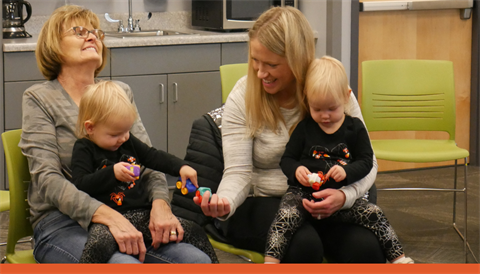For Families

Learning to read begins at birth. As parents and caregivers, you are your child’s first and best teacher.
There are five practices that help children develop the early literacy skills necessary for learning to read. Reading, talking, writing, singing, and playing are simple, effective practices for ensuring your child is on the path to school readiness and student success.
Click on each practice to learn about the programs and resources available at the library to equip you with the tools you need. Be sure to sign up for our Early Learning Newsletter to get new ideas delivered to your email each month.
For support in all things childcare, consult ParentTV for free with your library card. ParentTV features thousands of on-demand, research-based videos on everything from potty training to teen mental health.
Reading together is the most effective way parents and caregivers can help their child become proficient readers. Not every book needs to be different. Children love to re-read books and repetition is important. Reading the same book over and over helps your child recognize and learn story structure and build vocabulary, both important components in learning to read.
Children need to receive and create language to learn it. Talk with your child about anything you see, hear, smell, etc. and encourage your child to answer by asking open-ended questions that encourage conversation. After asking your child a question, silently count to ten to give them plenty of time to respond.
Early exposure to writing utensils will assist with fine motor skills as your child gets ready to enter kindergarten. Practice writing skills by providing your child with crayons, pencils, markers, and finger paints at an early age. Even sidewalk chalk will help prepare your child to write.
Children experience the world through play while developing fine and gross motor skills, cognitive concepts, language, and social skills.
Singing is a great way to learn about language. When we sing, the sounds that make up words become more evident. Sing the alphabet song and nursery rhymes, listen to music, or clap along to a song to demonstrate syllables.